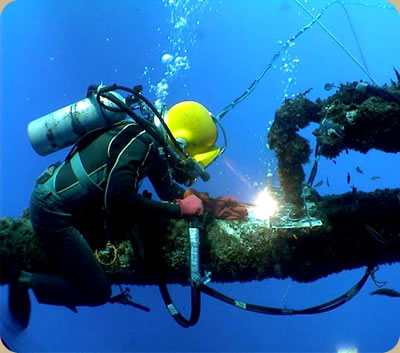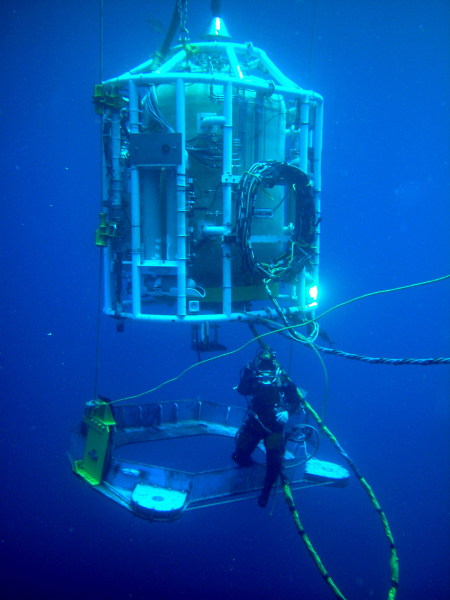The Subsea Industry
- The UK subsea industry sector leads the world in experience, innovation, services and technology
- Has over 750 companies with over 53,000 employees
- Worth GBP £8.9 billion in services and products
- Will continue to lead the world by sustaining and expanding this vital business sector
- UK trained commercial divers are arguably considered as the best in the world
- The Professional Diving Academy continue to lead the way in innovative course development and implementation
Critical Skills shortages
- Increasing worldwide energy demands from emerging economies resulted in a new oil and gas boom, however the recent US shale revolution and oversupply by OPEC has dampened this somewhat and we could well be looking at a reduction in offshore oil and gas diving projects in the coming months. However divers will always be needed, even during “lean” periods
- There has been massive growth in the offshore renewable energy sector since 2008
- Number of major saturation diving vessels increasing significantly over last five years – a true refeltion on the job prospects and investment going on
- Lack of succession planning throughout the 90’s which has left a significant ‘skills gap’ and critical shortage of qualified, experienced personnel
- Divers in the fifty plus age bracket retiring or moving into supervisory or client advisory roles
Offshore Air Diver
Supporting subsurface construction, inspection and maintenance projects associated with the production of oil and gas and renewable ‘green’ energy.- Qualification Required UK Waters: HSE Surface Supplied Top-Up or an ‘HSE recognised’ equivalent qualification
- Qualification Required International Waters: HSE Surface Supplied Top-Up or an ‘IMCA recognised’ qualification

The North Sea has controlled rates of pay through the Offshore Diving Industry Agreement (ODIA) which dates back to the early 1980s. This is 3-year collective agreement between 7 diving contractor companies and the RMT trade union, governing minimum rates of pay, allowances and health/injury insurance for UK North Sea diving personnel. Many diving companies who are not part of ODIA also work closely to the agreement and as a result, through negotiation with their clients, pay rates for air divers working on ‘offshore diving projects’ around UK waters are approx. GBP £540 – £580 per day.
In other parts of the world offshore pay rates and conditions vary considerably. An overall average for a UK qualified air diver working in offshore regions across the world in 2014 would be approx. USD $450 – $550 per day.
Working Terms:
- North Sea: Up to 28 days offshore – 12 hour days
- International: 50 to 90 days offshore – 12 hour days
Inshore Construction Diver:
- Qualification Required UK Waters: HSE Surface Supplied or a ‘recognised’ equivalent qualification
- Qualification Required International Waters: HSE Surface Supplied Top-Up or ‘recognised’ national qualification
- Many inshore divers will start out as self-employed freelancers although a few may be taken on as permanent staff with diving company when they have established themselves
Salaries in the inshore sector vary considerably depending on the company, the type of contract and the experience of individual divers, however the following can be used as an approximate guide for a diver working regularly with an inshore company:
- Aquaculture industry: GBP £25k – £35k per annum
- Marine construction/maintenance: GBP £35k – £50k per annum
- Renewable energy projects: GBP £50k – £70k per annum
Inshore work is very diverse and covers everything associated with construction, demolition, remedial works, salvage and inspection. More recently working with renewable energy companies who specialise in areas such as offshore wind and wave generators, have allowed many inshore divers to gain well paid employment on contracts that still fall under the inshore diving regulations.
The job can often mean long days and hard work, but it can be extremely satisfying to be part of team who must trust and rely on each other, even in the worst of weather! Because of our connection with the diving industry through our ADC registered sister company Shearwater Marine Services, the training you receive here at the PDA closely simulates the working environment mentality that you will need to be a success. We also ensure that many of the hydraulic and pneumatic tools that you are likely to use in the commercial world, are used during training in a realistic, safe manner and most importantly under work type conditions.
Saturation Divers
- Qualifications required: HSE Surface Supplied Diver, HSE Wet Bell/Top up and Closed Bell Diver

Salaries in this sector are wildly variable and most divers are self-employed. Saturation divers working in the North Sea benefit from the ODIA/RMT pay rate agreement and as such can expect to earn over GBP £1500 per day. In other parts of the rates and conditions vary considerably and are sometimes very much dependant on nationality. An overall average for a saturation diver working in offshore regions across the world in 2014 would be approx. US $1200 – $1500 per day.
Inshore Air Diving Supervisor
An Inland Air Diving Supervisor is normally an experienced and qualified air diver who has been appointed by the company following an assessment of knowledge and leadership skills. The UK’s Association of Diving Contractors (ADC) now has an examination programme in place which assesses these leadership skills as well as other important attributes such knowledge of risk management, emergency procedures and regulatory requirements. Many ‘client companies’ now insist that inshore diving supervisors have this qualification as a minimum, before allowing diving work to commence.Offshore Air Diving Supervisor
The International Marine Contractors Association (IMCA) is the world’s leading trade body for commercial diving and related marine matters. To be a Supervisor in an offshore environment it is necessary to have an IMCA qualification or an equivalent such as AODC.Experienced divers can progress to Trainee Diving Supervisor through a certification scheme for offshore diving supervisors which sets down minimum requirements. These include relevant diving experience, basic theoretical training, supervised ‘hands-on’ experience offshore, and a multi-choice theory examination. Examinations now provide compulsory modules relating to air diving supervision, mixed gas (or bell) diving supervision. Candidates also sit optional legislation modules relevant to the parts of the world in which they expect to work. Modules for the UK and Norway currently exist.
Supervisors also pass on information and knowledge gained from their own work experience to the trainee divers. The safety of divers is paramount and is the Supervisor’s responsibility.
Additional Qualifications and Experience
As a diver you should consider what you are bringing to the industry. What we mean by this is that although we can teach you to dive, you must think about what you are going to do when you get to the jobsite. Are you practical? A problem solver? Good with your hands? Do you have experience in the construction industry? Have you worked on a building site? Are you a qualified rigger? etc.Some topside skills which ‘might’ make the difference to a company accepting you for a job ahead of another diver:
- Engineering Qualification
- Mechanical/Electrical skills
- Diver Medic Technician
- Rigger/Slinger
- Crane Banksman
- Construction Site Experience
- Welder fabricator
- RYA Powerboat Certificate (Safety Boat Duties)
- Diving Helmet/Band-Mask Maintainer
Offshore Certificates Required:
- Basic Offshore Safety Induction and Emergency Training (BOSIET)
- Minimum Industry Safety Training (MIST)
- Offshore Safety Passport (OSP) – Some Far East Projects
In the early days of North Sea Diving, safety standards were poor which resulted in several serious accidents. The UK Government and the diving industry responded by creating what is deemed by many to be the best guidelines for commercial diver training in the world.
Much of these original procedures were adopted in other parts of the world and the International Marine Contractors Association (IMCA) the world’s offshore diving trade association, has also created a huge amount of guidance, utilising experiences from diving around the world. The Professional Diving Academy is an active member of this forum, contributing regularly to improvements in diver safety and learning.
The UK is the world leader in the creation of safe diving practices and techniques. All of the courses recognised by the International Diving Regulators (IDRF) Forum are based on the original HSE syllabus. This includes Australia, Canada and South Africa. The HSE has now progressed onto an improved competence based training system, allowing the PDA to implement a more advanced training approach than its predecessors.
hi
ReplyDelete